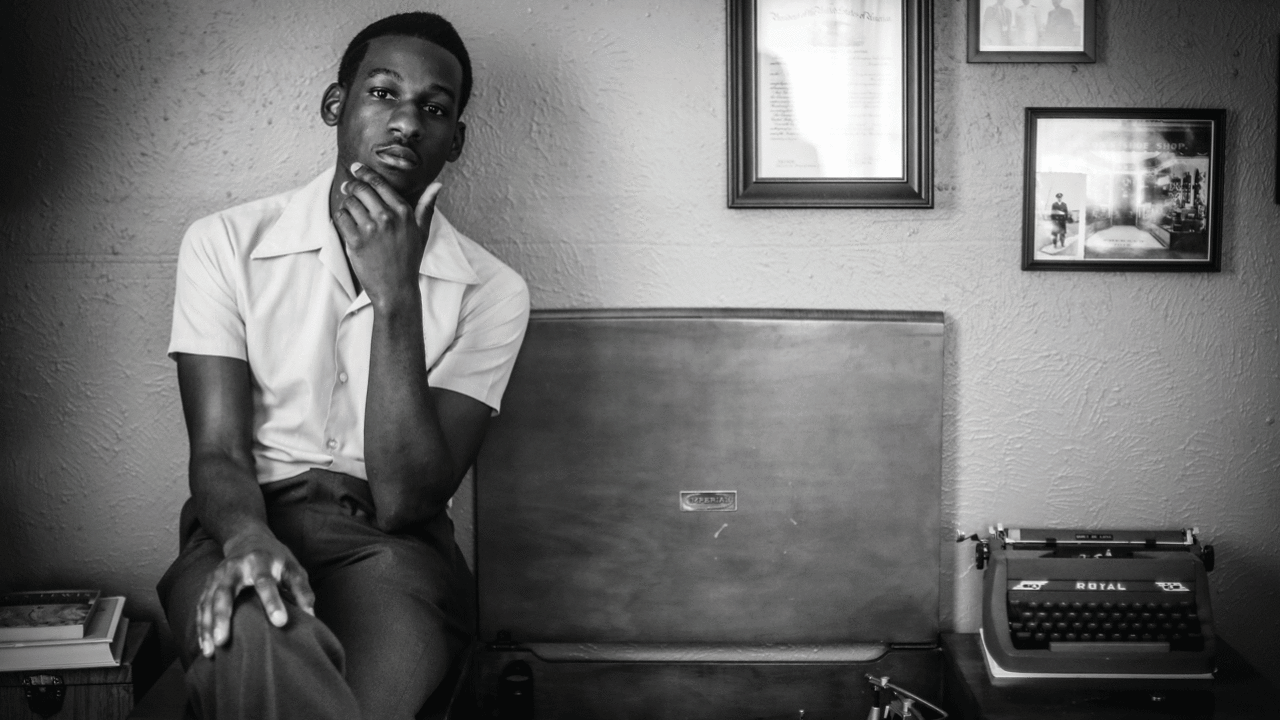Building Bridges: The Rise of Leon Bridges
Fuelled by the spirit of Sam Cooke and Otis Redding, Leon Bridges has hooked critics and roots music lovers alike…

Described as a “throwback to 60s soul a la Otis Redding and Sam Cooke” by The Wall Street Journal, and “The Truth” by his growing legion of fans, Leon Bridges is the sharp-dressed kid from Fort Worth, Texas who’s well on the road to becoming an international star.
Still only in his mid-20s, Bridges signed a major label deal in 2014 and released critically acclaimed debut album Coming Home in June this year. Produced by Joshua Block and Austin Jenkins of Texas psych band White Denim at their Niles City Sound studio in Fort Worth, the album has drawn critical acclaim for its vintage sound and Bridges’ pitch perfect 60s soul delivery.
You signed with Columbia Records in late 2014 – how has your life changed since then?
I started recording the album in August of last year, and released Coming Home and Better Man in October of last year. Since then, everything’s just moved so fast.
Rumour has it that you had 40 labels chasing you at one point?
Yeah, it was definitely a lot of labels that were interested in signing me so I we had a lot of leverage. I felt that Columbia was the best route out of all those labels. And they’re all great labels but I just felt at home with Columbia and connected, you know?
Was it always your ambition to sign with a major label or would you have preferred to be an underground artist?
Sign up below to get the latest from Classic Rock, plus exclusive special offers, direct to your inbox!
I would have been content either way cos I’ve done the-nobody-knows-me thing. If I had signed to an indie label I would have been just as content. But I wanted everybody to hear my music… the world. I felt Columbia would be able to put a big magnifying glass on what I was already doing.
Despite that, the recording of your album Coming Home was quite low-key and made with many of your friends…
Yeah. It’s cool. Austin Jenkins from White Denim said he wanted to make a record for me. He said, “Okay, I’m going to get some players together and we’re going to figure out a studio space.” And he gathered all these guys from around Fort Worth that are all in various projects, not session players, you know? It wasn’t like any Columbia hired guns. It was guys from Fort Worth. I called up some different friends of mine who weren’t session singers and said, “Come sing some songs.” I didn’t know how it would fit or work on the record but it worked out perfect.
When did you first cross paths with Austin?
It started back at a bar in Fort Worth. His girlfriend came up to me and she was like, “Hey, you look cute! You’ve got to meet my boyfriend. He wears Wranglers.” And we met, and he was just the nicest guy ever.
Apparently he liked the way you captured the 60s soul vibe…
Yeah. He saw me a week later playing solo and was inspired to make a record. He had been gathering up all this vintage equipment and been wanting to record a solo artist for a long time, and the door just opened when he saw me. And it’s such a great combination. And the same guys that went into the studio to record the album are the same guys that are touring with me.
Does your rising profile snag you some free food from Mi Cocina, the restaurant in Fort Worth where you used to wash dishes?
Yeah [laughs]. Actually, I released my record at this place called the Scat Jazz Lounge in downtown Fort Worth, right by my old restaurant.
They must be proud of you.
Yeah, they are. Aw, man. From day one, they’ve always been supportive. They’d come out to my shows and be so excited.
Is it true that before turning 21 you didn’t really care about music at all?
I loved listening to music but I never really thought about playing professionally. I’ve always loved to sing, but we’re always told that – and it’s true – a career as a singer, I mean, it’s one in a million, you know?
You made it work…
I’ve always had a great work ethic from day one when I was bussing tables and washing dishes. I thought that same work ethic could be applied to something I love.
These days you’re compared to soul icons such as Sam Cooke, Otis Redding and Marvin Gaye, but you started out working with a modern R&B sound…
When Austin got involved, I had already been writing this sound for about two years. But before that – I started writing music and singing about four years ago – I was into Usher and Ginuwine, and guys like Miguel who were bringing a more alternative side to R&B. That spoke to me. And Frank Ocean. I was even into Fink around that time, if you’ve ever heard of him. They were the guys I was listening to in the beginning.
What got you hooked on classic soul?
I wrote a song in that period of time and a friend asked me if Sam Cooke was one of my inspirations. I had never really listened to Sam Cooke when he asked that. And so after that I started to really dig in to that music and a door opened for me. I saw that this is the music I need to make.
You also play guitar?
Yeah. But I’m playing with an amazing band and what I’ve always wanted to do is just be a singer and focus on my voice. When guitar gets into the picture it’s hard for me to concentrate and give 100 per cent cos I’m thinking, “Okay, am I on time?”
Some of your fans call you “The Truth”. Where did that come from?
Aw, man. That’s something that I never labelled myself as, but I think people see something that’s honest and real. Of course, people are comparing me to pop music and saying, “Oh yeah, this is definitely refreshing compared to that.” But there are other artists out there who are saying something with substance. I think people are just seeing something that’s refreshing in the mainstream, and they’re connecting with it.
Not many young black artists are working with a classic soul sound. Was it important to you to re-establish that connection?
Yes, because those artists were all black men. I thought, “Why aren’t my people writing this type of music?”
It’s not just about the sound. You’ve also tapped into the 60s soul look.
Exactly. And the look is not anything that I’m doing to be flashy. It’s something I felt, when I started writing the music, goes hand in hand with the sound. It wouldn’t make sense to me if I was on stage in a graphic T-shirt and some shorts or something like that [laughs]. It wouldn’t be the same. And it’s so beautiful: high-waist pants, a shirt and some nice shoes, you know? I’m fascinated with the music and the fashion.
How retro are you? Do you only wear, drive and listen to things that are from before 1970?
Haha, I’m still living in a modern world! I have a cellphone. I do want to get me a classic car. That would be the cherry on top of the ice cream.
Do you ever feel like you were born in the wrong decade?
Hmm. Not at all. If I was born in the 50s I would have been just another R&B artist. It was hard, you know, for even the best of singers to really make their way and be on the top. You look at Sam Cooke, he was very successful in that. But you had the social side to that time that was very wrong. I think that me being in this time, able to carry on what the forefathers did, can be light to a new generation.
It’s like you’re carrying the torch.
Exactly. And I’ll never be able to amount to those guys, you know? I can only do what Leon Bridges can do.
The modern world has its advantages. SoundCloud and social media were instrumental in your success.
You can look at my Instagram page, even before I signed to Columbia and it was the same thing from then.
You mean your image was the same off stage as it was when you performed? The vintage look is not some uniform you only wear when you’re working?
Exactly. I made it in my mind that I wanted everything to be consistent. I would see different artists’ pages and think, “I don’t want to see a picture of your sandwich.” I’m glad to be on point with that.
What’s the story behind Coming Home, the album’s title track?
That was a song that I wrote after finding my voice within classic soul music. I wasn’t even in a relationship at the time, but you don’t really have to experience a situation to write about it. If you look at an artist, like a painter, he probably hasn’t been to certain places that he paints. It’s his imagination. When I wrote Coming Home, it was my idea of what a 50s or 60s soul song would sound like.
Most of your songs seem to centre around girls, love and relationships. Did you – as you sing in the lyrics of Better Man – ever swim the Mississippi for a girl?
Oh, no, not at all. But, I mean, a lot of the R&B back then, it was centered around love. And I think that’s the easiest kind of route to go when writing for me. Just use a way to talk about love and you just package it in different packages to make it fresh. But also for me, the biggest thing is family, and so I not only write about girls, I also write about my love for my mother.
All the great singers like Marvin Gaye, Sam Cooke, Percy Sledge and Otis Redding, they all focused on love in the music they made.
Mm-hmm. That’s true, man. It’s just something that everybody can connect with, you know?
You’re currently young, free and single. Do you think that helps or hinders the writing process?
It’s funny cos when I was in a relationship it was kind of weird to write about heartbreak. I would write a song and my girl would say, “Wait, who’s Daisy May?” I’m like, “It’s just a song, girl!”
Brown Skin Girl from the new album is about a relationship though, isn’t it?
It was actually about my ex-girlfriend, and she’s a sweet girl. But now that song can be applied to all the girls of colour. So it works out [laughs].
You spoke earlier about the problems that artists such as Sam Cooke faced during the 60s. Soul music became increasingly politicised as the civil rights movement progressed back in those days. Yet, as we’ve seen in the news coming from the States over the past year, racism is still a massive issue in America…
Yeah, and it’s happening all over. And for a lot of my friends, and myself, it’s really sad to see and it really brings me down. All I can do is pray for things to change and do my part by making great music and showing theworld and my people that it’s okay to be yourself, and there’s hope outside of the craziness.
Leon Bridges’ debut album Coming Home is out now via Columbia Records. Visit his website for more info.
